Mel Allen
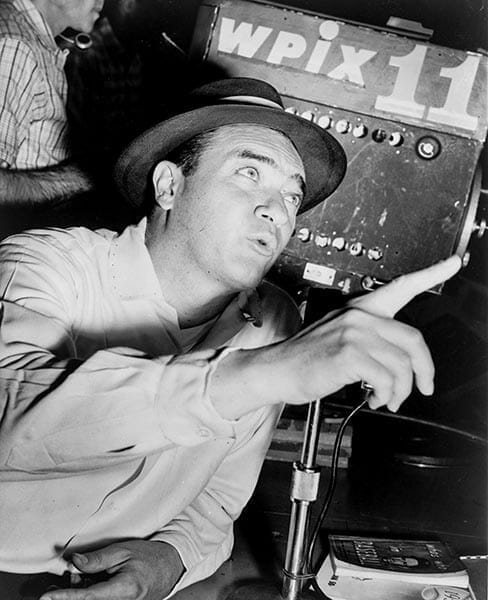 Mel Allen
Mel Allen (1913-1996) delivered the radio play-by-play for the New York Yankees for 25 years at the height of the team’s success. He had one of the most recognizable voices in sportscasting for six decades, and his style and approach to calling the games have served as a model for baseball announcers of the present day. Allen was also an important figure in the early days of television broadcasting of sports events, providing the play-by-play for numerous college football games as well as Yankees games.
Mel Allen
Mel Allen (1913-1996) delivered the radio play-by-play for the New York Yankees for 25 years at the height of the team’s success. He had one of the most recognizable voices in sportscasting for six decades, and his style and approach to calling the games have served as a model for baseball announcers of the present day. Allen was also an important figure in the early days of television broadcasting of sports events, providing the play-by-play for numerous college football games as well as Yankees games.
Allen was born Melvin Israel in Johns, Jefferson County, on February 14, 1913, to Jewish immigrants Julius and Anna Israel, whose families had fled persecution in czarist Russia. He had a sister, Isabel, and a brother, Larry. Larry eventually took the name Allen and assisted Mel as a statistician for his broadcasts for many years. In Mel Allen’s youth, his family lived in several small Alabama towns, including Sylacauga, Talladega County, where his father ran a variety of businesses, including shoe and dry goods stores. The family then settled in Birmingham, where Allen finished high school. The family moved to Tuscaloosa when Allen enrolled at the University of Alabama at the age of 15. His journalism career began there as a writer for The Crimson White, the campus newspaper. He caught the attention of Alabama football coach Frank Thomas for his work as a public-address announcer at Crimson Tide home games. When a local radio station asked the coach to recommend a play-by-play announcer, Thomas misunderstood the request and recommended Allen for the job. He quickly made the most of the opportunity.
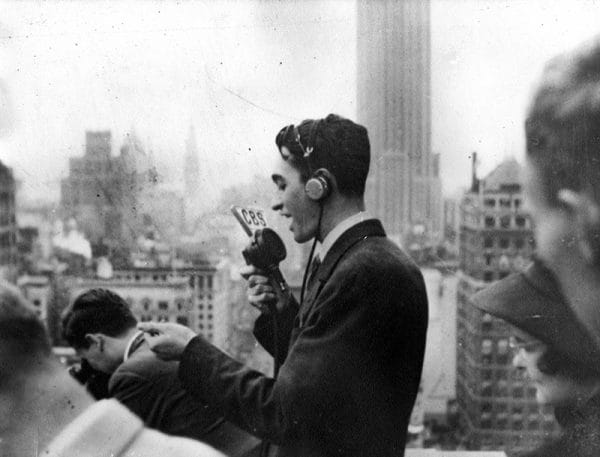 Mel Allen, 1938
Allen began broadcasting University of Alabama and Auburn University football games over a network of radio stations in 1935 while attending law school at Alabama. He intended to go into law practice and taught speech classes for a year at the university, but as he later said, his avocation became his vocation. In 1937, Allen left Alabama for a successful audition with the Columbia Broadcasting System (CBS) in New York, taking his father’s middle name as his new on-air last name when the network suggested that he change his name to something “less Jewish.” He broadcast news and entertainment shows and game shows and handled a variety of sports assignments, including the 1938 World Series for CBS, Washington Nationals baseball, and New York Giants baseball, before taking the job with the Yankees in 1939 that made him famous.
Mel Allen, 1938
Allen began broadcasting University of Alabama and Auburn University football games over a network of radio stations in 1935 while attending law school at Alabama. He intended to go into law practice and taught speech classes for a year at the university, but as he later said, his avocation became his vocation. In 1937, Allen left Alabama for a successful audition with the Columbia Broadcasting System (CBS) in New York, taking his father’s middle name as his new on-air last name when the network suggested that he change his name to something “less Jewish.” He broadcast news and entertainment shows and game shows and handled a variety of sports assignments, including the 1938 World Series for CBS, Washington Nationals baseball, and New York Giants baseball, before taking the job with the Yankees in 1939 that made him famous.
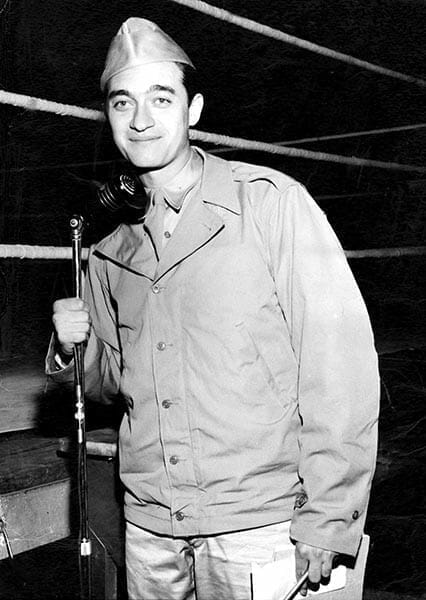 Mel Allen in Uniform
Allen developed a broadcast style that became a model for subsequent generations of radio sports broadcasters. Audiences enjoyed Allen’s ability to create word pictures that allowed them to visualize the action on the field. He developed catch phrases that often incorporated the names of cigar and beer sponsors, such as a “White Owl wallop” or a “Ballantine blast,” which described home runs. Other Allen phrases, delivered in a smooth southern drawl, have become part of the general sports lexicon, including the famous “How about that!” and “Going, going, gone!” Allen’s broadcasting career was interrupted by service in the U.S. Army from 1943 to 1946, during which time he hosted the “Army Hour” on Armed Forces Radio. Service to country became a consistent theme in Allen’s life, and he was appointed by Pres. Dwight Eisenhower in 1956 to a national task force on youth physical fitness and visited troops in Vietnam and Cuba in the 1960s.
Mel Allen in Uniform
Allen developed a broadcast style that became a model for subsequent generations of radio sports broadcasters. Audiences enjoyed Allen’s ability to create word pictures that allowed them to visualize the action on the field. He developed catch phrases that often incorporated the names of cigar and beer sponsors, such as a “White Owl wallop” or a “Ballantine blast,” which described home runs. Other Allen phrases, delivered in a smooth southern drawl, have become part of the general sports lexicon, including the famous “How about that!” and “Going, going, gone!” Allen’s broadcasting career was interrupted by service in the U.S. Army from 1943 to 1946, during which time he hosted the “Army Hour” on Armed Forces Radio. Service to country became a consistent theme in Allen’s life, and he was appointed by Pres. Dwight Eisenhower in 1956 to a national task force on youth physical fitness and visited troops in Vietnam and Cuba in the 1960s.
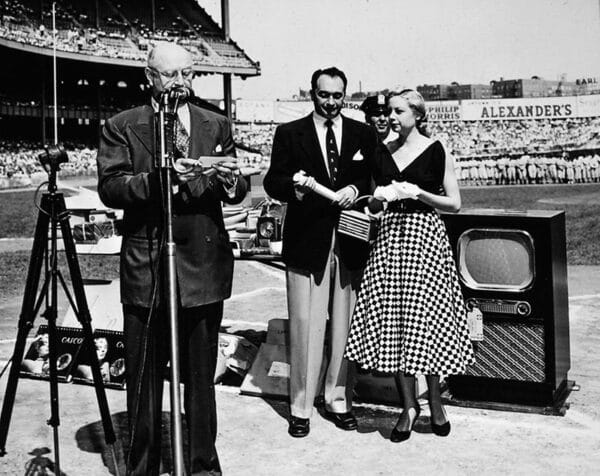 Mel Allen Day
Allen was accused by some fans (mostly supporters of opposing teams) of being biased in his Yankees broadcasts. In an era when there was more frequent interaction between players and the media, Allen described himself as “partisan but not prejudiced.” He was able to appreciate outstanding players and plays of opposing teams. In all, he called 22 World Series, including 18 in a row between 1946 and 1963. In addition to chronicling the Yankees dynasty, Allen was also the nation’s top college football announcer during the 1950s and early 1960s, broadcasting 14 Army-Navy games and numerous bowl games. He was also the voice of many Movietone newsreels shown in movie theaters and was for several years the host of the National Broadcasting Company (NBC) Saturday morning radio show, Monitor. Allen bridged the era between the Golden Age of radio sportscasting and the modern era dominated by television, but found the transition to television difficult. A frequent criticism of Allen’s television work was that he talked too much and got in the way of the telecast.
Mel Allen Day
Allen was accused by some fans (mostly supporters of opposing teams) of being biased in his Yankees broadcasts. In an era when there was more frequent interaction between players and the media, Allen described himself as “partisan but not prejudiced.” He was able to appreciate outstanding players and plays of opposing teams. In all, he called 22 World Series, including 18 in a row between 1946 and 1963. In addition to chronicling the Yankees dynasty, Allen was also the nation’s top college football announcer during the 1950s and early 1960s, broadcasting 14 Army-Navy games and numerous bowl games. He was also the voice of many Movietone newsreels shown in movie theaters and was for several years the host of the National Broadcasting Company (NBC) Saturday morning radio show, Monitor. Allen bridged the era between the Golden Age of radio sportscasting and the modern era dominated by television, but found the transition to television difficult. A frequent criticism of Allen’s television work was that he talked too much and got in the way of the telecast.
As his broadcasts’ sponsors began to suffer from declining sales in the mid-1960s, pressure grew on the Yankees’ ownership to replace him. They removed him from the World Series broadcast team in 1964 and, in a decision that has never been fully explained, did not renew his contract for the following season. Over the next decade, Allen handled a variety of assignments, including occasional broadcasts of Cleveland Indians and Milwaukee Brewers baseball games and University of Miami sports events.
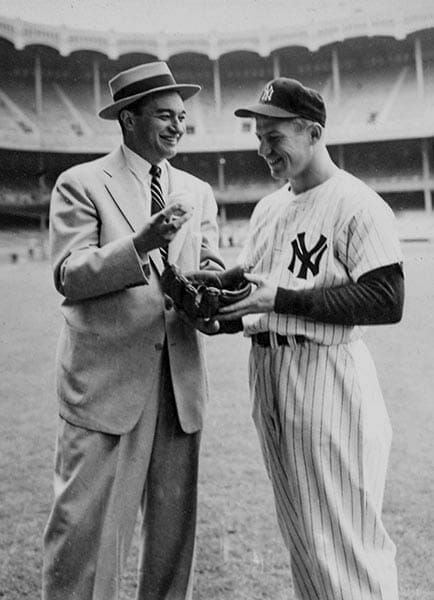 Mel Allen and Mickey Mantle
In the summer of 1977, Allen’s career took an upward turn when he became the host of This Week in Baseball, a television show that introduced him to a new generation of baseball fans. The weekly package of game highlights was produced and syndicated to local stations by Major League Baseball and played on video scoreboards in major league ballparks throughout the country. The newfound exposure prompted New York Yankees owner George Steinbrenner to bring Allen back to Yankee Stadium for regular appearances on Yankees’ cable broadcasts from 1977 to 1985.
Mel Allen and Mickey Mantle
In the summer of 1977, Allen’s career took an upward turn when he became the host of This Week in Baseball, a television show that introduced him to a new generation of baseball fans. The weekly package of game highlights was produced and syndicated to local stations by Major League Baseball and played on video scoreboards in major league ballparks throughout the country. The newfound exposure prompted New York Yankees owner George Steinbrenner to bring Allen back to Yankee Stadium for regular appearances on Yankees’ cable broadcasts from 1977 to 1985.
Allen was honored by the Baseball Hall of Fame in 1978 when he and his one-time broadcasting partner, fellow southerner, and long-time rival, Brooklyn Dodgers broadcaster Red Barber were the first recipients of the Ford Frick Award. It was the first time the Hall of Fame recognized the contributions of broadcasters to the game.
Allen was plagued by health problems in later years, undergoing a heart bypass operation in 1989. He was saddened by the death of former Yankees slugger Mickey Mantle in 1995, hosting a tribute to him on This Week in Baseball. Just before the show was to start its twentieth season, Allen died of a heart attack at his home in Connecticut on June 16, 1996. He was buried at the Beth-el Cemetery in Stamford, Connecticut.
Throughout his life, Allen embraced his Alabama heritage, returning to the state, especially Tuscaloosa and the University of Alabama, for a variety of events and programs. He always credited his early experiences in broadcasting in Alabama for his subsequent success as one of sports broadcasting’s most influential announcers. Allen was enshrined in the Radio Hall of Fame in 1988 and the Alabama Communications Hall of Fame at the University of Alabama in 1998.
Further Reading
- Allen, Mel, and Ed Fitzgerald. You Can’t Beat the Hours. New York: Harper & Row, 1965.
- Borrelli, Stephen. How About That!: The Life of Mel Allen. Champaign, Ill.: Sports Publishing, 2005.
- Halberstam, David. Summer of ’49. New York: William Morrow, 1989.



